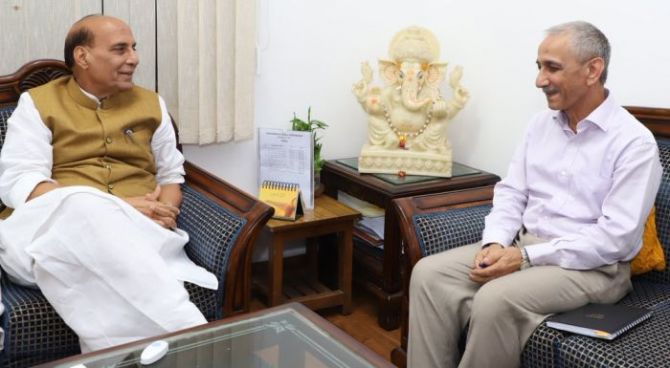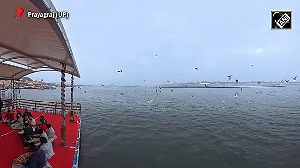'The government is in no hurry to talk to the separatists and would like to approach the Kashmiri people directly through various other organisations.'
'Officials in charge of J&K affairs at the Centre are clear that there would be no let up in the operations against terrorists,' reveals BharatShakti.in founder Nitin A Gokhale.

Former Intelligence Bureau director Dineshwar Sharma's appointment as the interlocutor for a 'sustained' interaction and dialogue with stakeholders in Jammu and Kashmir is a logical step forward in the Centre's outreach to the people of the state that began with Prime Minister Narendra D Modi's Independence Day declaration that 'Neither by bullet nor by abuses but only by an embrace we can solve the problem of Kashmir (Na goli se na gali se baat banegi gale laga ne se).'
The prime minister's declaration was followed up by Home Minister Rajnath Singh's four-day visit to J&K in September.
Singh's extensive meetings with more than 80 delegations of various hues was confirmation of the Centre's intention to reach out to the awam (common people) in J&K.
The 'soft' approach comes on the back of a nearly year-long hard crackdown that the government was forced to order after the unrest in the wake of the killing of Hijbul Mujahideen 'commander' Burhan Wani in July 2016.
Having got the security situation under manageable control with a sustained and focused counter-insurgency, counter-terrorist (CI-CT) operations, the Centre, in consultation with J&K Chief Minister Mehbooba Mufti, felt the time was right to make the conciliatory move.
Initial reactions from the state are understandably cautious. The separatists have chosen not to comment so far perhaps because it is not clear yet if Sharma will reach out to them.
The government press note, announcing Sharma's appointment speaks of 'a dialogue with the elected representatives, various organisations and concerned individuals in the state of Jammu and Kashmir.'
Sharma will initiate a 'sustained interaction and dialogue to understand the legitimate aspirations of the wide cross sections of society, particularly the youth in Jammu and Kashmir and communicate them to the state government and the Centre, the press note added.
Questions have been raised about the cases initiated by the National Investigation Agency against some separatist leaders and whether those cases would prove to be an impediment in the reconciliation process.
Indications are that the cases -- mostly related to terror and terror funding against specific individuals -- will continue even as we await clarity on the government's approach towards the Hurriyat leadership.
My sense is: The government is in no hurry to talk to the separatists and would like to approach the people directly through various other organisations.
Similarly, officials in charge of J&K affairs at the Centre are clear that there would be no let up in the pin-pointed, intelligence-based CI-CT operations against terrorists.
A lot of hard work has gone into getting the security situation under control in the past year and there is no plan to ease the pressure, they contend.
Sharma, who retired as director, IB in December 2016, is known to be a low profile but effective official with wide-ranging experience in the security domain as well knowledgeable about the core concerns in J&K.
He was chosen over a host of political choices, mainly because Prime Minister Modi, Home Minister Rajnath Singh and National Security Adviser Ajit Doval felt that a non-political person would have wider acceptance across the spectrum in J&K.
A politically affiliated personality would, on the other hand, be restricted in his or her approach, the decision-makers felt.
Sharma, a 1979 batch IPS officer of the Kerala cadre, has worked closely with Doval and Rajnath Singh (when he was Uttar Pradesh chief minister) and has Prime Minister Modi's confidence.
With the rank of Cabinet Secretary, Sharma has been given the appropriate status and the requisite authority to deal with various government departments to initiate measures that would be required to signal the government's commitment towards development of Jammu and Kashmir.
The Centre has long felt that the development package for J&K worth Rs 80,060 crores (Rs 800.60 billion) announced by Prime Minister Modi in November 2015 needs a big push on the ground.
While it is not clear if Sharma's mandate includes overseeing the implementation of the development assistance, his authority should ensure that government departments entrusted with releasing funds and completing promised projects would speed up delivery.
In all fairness though, Sharma's main task is to bridge the trust deficit that currently exists between the people and the state government in J&K.
In much the same manner as the government's approach towards the Naga issue -- where its interlocutor R N Ravi has spent a good part of three years in creating confidence and a sense of unity in a deeply divided society -- the Centre will be hoping that Sharma will be able to reach out to larger sections of the society in J&K.
In a way, his appointment will take some pressure off the beleaguered Mehbooba Mufti government and lend some heft to its legitimacy.
The government has rightly refrained from putting a timeframe and desisted from defining desired outcome at this stage.
However, indications from within the government suggests that it is clear on one aspect: The new outreach is entirely internal to India and a third party (read Pakistan) will have no role whatsoever in the process.
Sharma is not the first interlocutor to be appointed by the Centre.
Since 2001, three such attempts have been made with K C Pant, N N Vohra and a three-member panel of Dileep Padgaonkar, Radha Kumar and M M Ansari acting as interlocutors. None of those efforts were however taken to their logical conclusion.
Hopefully, Dineshwar Sharma will be able to break that jinx since the government has taken the decision from a position of strength and not compulsion under any pressure.
IMAGE: Former Intelligence Bureau director Dineshwar Sharma, right, with Union Home Minister Rajnath Singh after being appointed the Centre's representative in Jammu and Kashmir, October 23, 2017. Photograph: ANI











 © 2025
© 2025